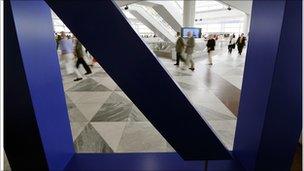Deutsche Bank charged in South Korea over stock rout
- Published

Deutsche Bank's South Korean brokerage is facing charges over improper trading
Deutsche Bank's South Korean brokerage and four of its employees have been charged with illegally manipulating Seoul's stock market last year.
Korean prosecutors allege the firm earned more than 45bn won ($41.5m; £25m) in unfair trading on 11 November.
In a statement, Deutsche Bank denied the charges and said it would defend itself in court.
Seoul's benchmark share index fell by 48 points, or 2.7%, in the last 10 minutes of trading on 11 November.
Korea's Financial Services Commission confirmed that about 2.4tn won in sell orders from foreign investors were processed on that day, most of them through Deutsche Bank's local securities unit.
In February this year, financial authorities banned Deutsche Bank's Korean unit from trading shares and derivatives for its own account for six months starting from April.
Deutsche was also fined 1bn won over the alleged manipulation, the largest fine handed down by Korea's stock exchange.
'Remedial measures'
On Sunday, a statement issued by the Frankfurt-based lender called the latest charges "regrettable" and said it "sincerely regrets the impact on the Kospi market of an index arbitrage position unwind involving a small number of Deutsche Bank Group employees".
"DSK [Deutsche Securities Korea] did not authorise or condone any breach of market regulation," the bank said.
"Deutsche Bank was not indicted in this matter and its business operations in Korea are not affected by this decision," it added.
Regarding the four employees who have been charged, Deutsche Bank said: "The employees concerned are either suspended or on administrative leave and are not involved in bank activities currently. They are expected to respond to these charges in the course of the legal proceedings.
"Deutsche Bank is in the process of implementing remedial measures including disciplinary action against the relevant employees where appropriate, and re-emphasising its existing internal control systems."
Tougher rules
South Korea has grown increasingly concerned about the potential risks from speculative trading and has taken steps to control foreign investors.
Earlier this month, regulators announced a ban on short-selling until November after the global market volatility caused a six-day sell-off.
Short-selling is a strategy in which investors borrow stock to sell on the expectation it can be purchased later at a lower price.
The nation has already banned so-called naked short-selling, where investors do not borrow the shares.
- Published25 February 2011